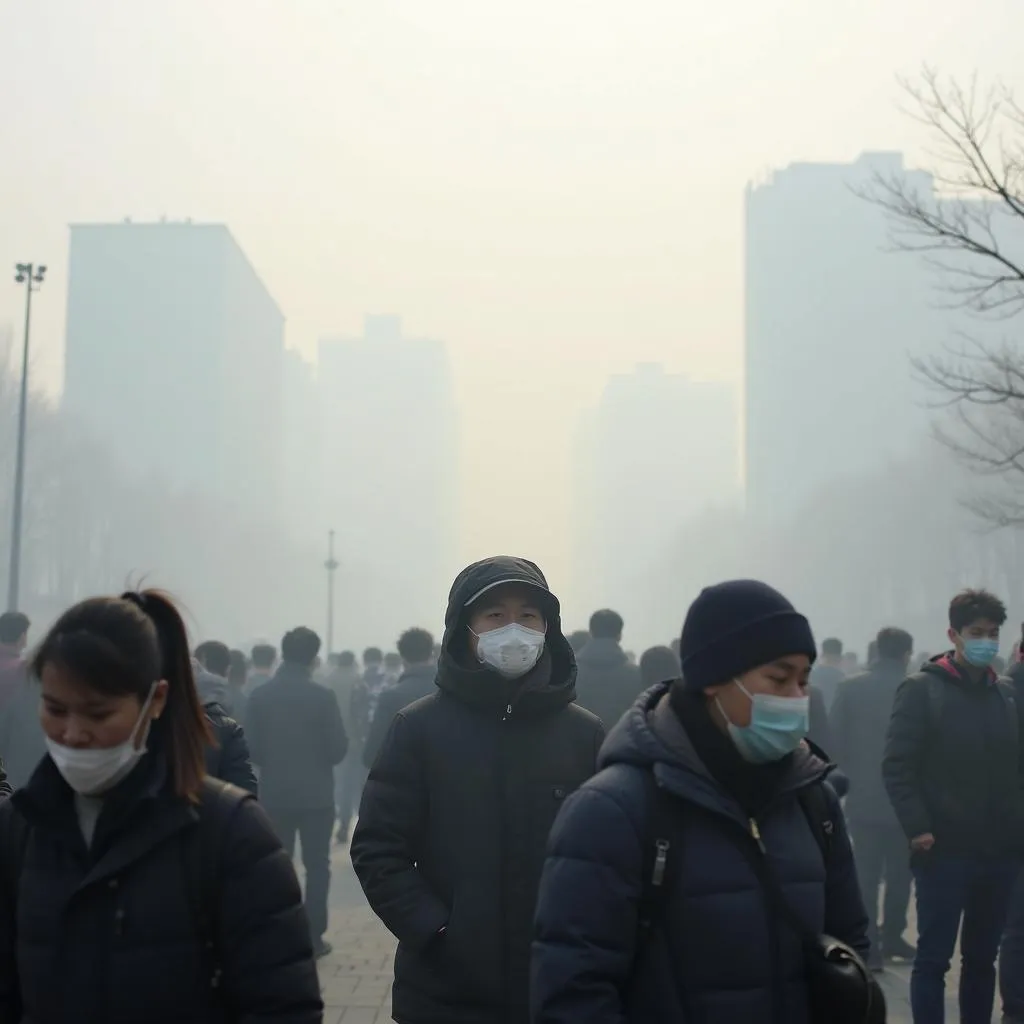Part 1: Introduction and Interview
In this section, the examiner may ask you some general questions about pollution and the environment. Here are some possible questions:
- Do you think pollution is a serious problem in your city?
- What kinds of pollution are you most concerned about?
- Have you ever visited a place that was heavily polluted?
Let’s look at a sample answer for question 3:
Sample answer (Band 8-9):
“Yes, I have. A few years ago, I visited Beijing during a particularly severe bout of air pollution. The smog was so thick that it was difficult to see more than a few meters ahead. I remember feeling quite overwhelmed by the oppressive atmosphere and the constant need to wear a mask outdoors. It was a real eye-opener regarding the tangible effects of pollution on daily life.”

Part 2: Long Turn
Here’s a sample cue card related to the topic:
Describe a polluted place you visited and its impact on you
You should say:
- Where and when you visited this place
- What kind of pollution you noticed
- How it affected you and others around you
- And explain how you felt about this experience
Sample answer (Band 6-7):
“I visited New Delhi, India, about two years ago during winter. The air pollution there was really bad. You could see a thick layer of smog covering the city. It was hard to breathe, and my eyes were always itchy. Many people on the streets were wearing masks. I felt very uncomfortable and worried about my health. The experience made me realize how serious pollution can be and how it affects people’s daily lives.”
Sample answer (Band 8-9):
“I had the eye-opening experience of visiting New Delhi, India, approximately two years ago during the winter season. The city was engulfed in a thick blanket of smog, which was a stark manifestation of its notorious air pollution problem. The particulate matter in the air was so dense that it significantly reduced visibility, creating an almost apocalyptic atmosphere.
The pollution was palpable in every sense. The air had a distinct acrid odor, and breathing felt laborious. My eyes were constantly irritated, and I developed a persistent cough within just a few days. It was disheartening to see locals and fellow tourists alike struggling with the adverse effects of the polluted environment.
This experience left an indelible impression on me. It was a sobering reminder of the dire consequences of unchecked industrial growth and inadequate environmental regulations. I felt a mix of concern for the residents who had to endure these conditions daily, and gratitude for the cleaner air in my hometown. It galvanized my commitment to environmental causes and made me realize the urgency of addressing air pollution on a global scale.”
Follow-up questions:
- How did this experience change your views on pollution?
- What measures do you think should be taken to reduce pollution in cities like New Delhi?
Sample answer for question 1 (Band 8-9):
“This experience was truly transformative in shaping my perspective on pollution. It brought home the reality of how environmental degradation can directly impact quality of life. I became much more cognizant of the far-reaching consequences of pollution, not just on human health, but also on the economy and social fabric of a community. It spurred me to become more proactive in my own environmental efforts and to advocate for stricter pollution control measures in my own community.”
Part 3: Two-way Discussion
Examiner: Do you think individuals can make a difference in reducing pollution?
Sample answer (Band 6-7):
“Yes, I think individuals can help reduce pollution. We can do small things like using public transport, recycling, and saving energy at home. If many people do these things, it can make a big difference. However, I also think big companies and governments need to do more to really solve the problem.”
Sample answer (Band 8-9):
“Absolutely. I believe individual actions can collectively contribute significantly to pollution reduction. While it’s true that systemic changes at the industrial and governmental levels are crucial, we shouldn’t underestimate the power of personal choices. Simple actions like opting for sustainable transportation, minimizing single-use plastics, and being mindful of our energy consumption can create a ripple effect.
Moreover, individuals can exert influence through their consumer choices, supporting businesses with environmentally friendly practices. They can also amplify their impact by raising awareness and advocating for stronger environmental policies. However, it’s important to strike a balance and recognize that truly effective solutions require a concerted effort from individuals, corporations, and governments alike.”
Key Vocabulary and Phrases
-
Engulfed (verb) /ɪnˈɡʌlft/ – Surrounded or covered completely
Example: The city was engulfed in a thick blanket of smog. -
Palpable (adjective) /ˈpælpəbl/ – So intense as to be almost touchable
Example: The pollution was palpable in every sense. -
Galvanize (verb) /ˈɡælvənaɪz/ – Shock or excite someone into taking action
Example: The experience galvanized my commitment to environmental causes. -
Cognizant (adjective) /ˈkɒɡnɪzənt/ – Having knowledge or awareness
Example: I became more cognizant of the far-reaching consequences of pollution. -
Systemic (adjective) /sɪˈstemɪk/ – Relating to a system, especially as opposed to a particular part
Example: Systemic changes at the industrial level are crucial for reducing pollution.
Examiner’s Advice
To achieve a high score in IELTS Speaking, particularly when discussing topics like pollution:
- Use a range of vocabulary, including less common words and phrases related to the environment and pollution.
- Provide detailed responses with personal examples and opinions.
- Use a variety of grammatical structures, including complex sentences.
- Speak fluently and coherently, organizing your ideas logically.
- Pronounce words clearly and use appropriate intonation to convey meaning effectively.
Remember to practice regularly, focusing on developing both your language skills and your ability to express ideas on various topics confidently and articulately.